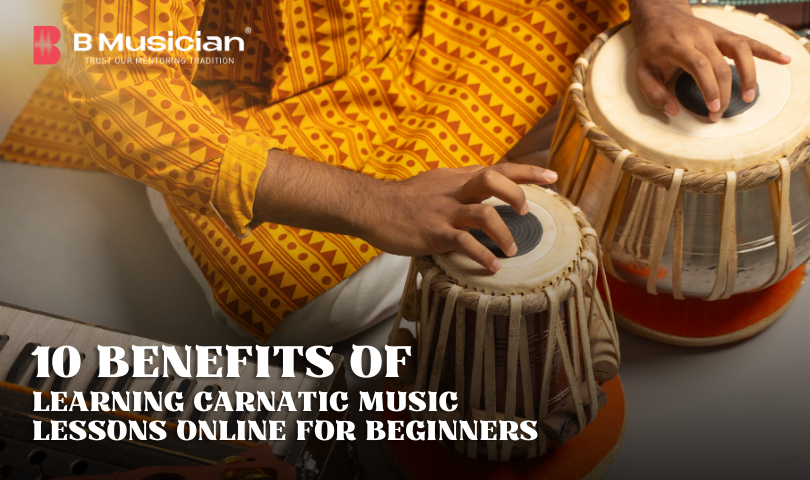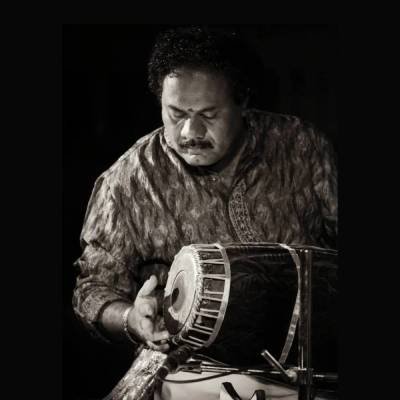Introduction
Music has always been one of the most powerful ways humans express emotions, preserve culture, and create connections. Among the rich musical traditions of the world, Carnatic music, an ancient and intricate classical form from South India stands out for its depth, spirituality, and emphasis on discipline. Traditionally, learning Carnatic music meant sitting at the feet of a guru, often in an intimate setting, where knowledge was passed down orally from generation to generation.
In the modern era, the way music is taught has expanded. The digital revolution has made it possible for anyone, anywhere, to access structured training from experienced gurus through online music lessons. This shift is particularly significant for beginners, who may be curious about Carnatic music but lack access to teachers nearby. Today, Carnatic music lessons online have opened new doors, combining the age-old wisdom of tradition with the convenience of technology.
In this blog, we’ll explore the origin and development of Carnatic music, the importance of integrating music into daily life, the traditional Guru-Shishya learning model, its adaptation in the digital era, and finally, the 10 major benefits of learning Carnatic music lessons online for beginners.
The Origin and Development of Carnatic Music
Carnatic music traces its roots back thousands of years, deeply entwined with Indian spirituality, temple traditions, and the pursuit of divine connection through sound. Its origins can be found in the Sama Veda, one of the oldest Hindu scriptures, where chants and hymns evolved into structured melodic forms. Over centuries, this evolved into the sophisticated system of ragas (melodic scales) and talas (rhythmic cycles) that define Carnatic music today.
While Carnatic music shares similarities with Hindustani music (the classical music tradition of North India), it developed independently after the 12th century. Saint composers like Purandara Dasa, often called the “Father of Carnatic Music,” codified teaching methods and composed beginner-friendly pieces that remain the foundation of Carnatic pedagogy. Later luminaries like Tyagaraja, Muthuswami Dikshitar, and Syama Sastri enriched the tradition with timeless kritis (compositions).
Carnatic music has always emphasised Bhakti (devotion), making it not just a form of entertainment but also a spiritual practice. Over the years, its teaching methods and performance styles have adapted to changing times, while still retaining its essence.
Integrating Carnatic Music into Daily Life
One of the unique aspects of Carnatic music is how naturally it can integrate into daily life. For centuries, families in South India encouraged children to begin their musical journey early, often before the age of 7. Singing simple varnams or kritis became part of morning prayers or evening cultural gatherings.
Even today, learning Carnatic music has practical benefits beyond performance:
- It sharpens the mind by developing memory, focus, and discipline.
- It enhances listening skills and improves the ability to concentrate.
- It promotes emotional well-being by offering an outlet for expression.
- It connects learners with centuries of cultural heritage.
In the modern world, where stress and distractions are common, having music woven into everyday routines whether through short practice sessions or listening exercises can bring peace and balance.
The Guru-Shishya Tradition
At the heart of Carnatic music lies the Guru-Shishya parampara (teacher-disciple tradition). In this ancient system, students lived with or regularly visited their guru, not only to learn music but also to absorb values, discipline, and a holistic way of life. The guru was not merely a teacher but a mentor and guide, shaping the student’s character as much as their musical abilities.
This system emphasised oral transmission students repeated what the guru sang or played, gradually internalising ragas and talas. Over time, students earned the trust of the guru, receiving advanced training and opportunities to perform.
While this immersive model produced legendary musicians, it also demanded significant time, physical proximity, and dedication, something not always feasible for modern learners with busy schedules or limited access to qualified teachers.
Carnatic Music in the Modern Era: Learning Online
Today, the way music is taught has transformed dramatically. Thanks to technology, online music lessons allow students to connect with gurus across the globe. Through video conferencing platforms, recorded tutorials, and interactive apps, the essence of Carnatic pedagogy is being preserved while also being made accessible to a wider audience.
Many experienced musicians now conduct Carnatic music lessons online, offering personalised guidance while leveraging digital tools such as notations, audio recordings, and practice apps. For beginners, this means that distance, time zones, or lack of local teachers no longer stand in the way of learning.
Importantly, online music platforms are not replacing the guru-shishya bond but rather reinterpreting it. The relationship remains central: students still respect and learn from their teachers but it is now possible in virtual spaces as well.
10 Benefits of Learning Carnatic Music Lessons Online for Beginners
Now let’s dive into the most significant advantages of starting your Carnatic music journey through online platforms:
1. Accessibility to Expert Gurus Worldwide
One of the greatest benefits of Carnatic music lessons online is access to highly qualified teachers, regardless of where you live. Even if you are based outside India or in a small town without local music schools, you can learn directly from renowned gurus.
2. Flexibility in Scheduling
Unlike traditional classes that require commuting, online music lessons allow you to choose a schedule that fits your lifestyle. Beginners can balance studies, work, or other commitments while still attending regular classes.
3. Cost-Effectiveness
Learning Carnatic music online often proves more affordable. Travel costs, accommodation for distant gurus, and even higher in-person fees can be avoided. Additionally, many platforms offer trial sessions, group classes, or tiered pricing.
4. Personalised Learning Pace
With online lessons, you can learn at your own pace. Beginners often struggle in large group settings where the pace might feel too fast. Online sessions allow for customised lesson plans based on your skill level and progress.
5. Recorded Lessons for Revision
A major advantage of learning online is that sessions can often be recorded (with the guru’s permission). This means you can revisit difficult sections as many times as needed something impossible in a one-time live class.
6. Integration with Modern Tools
Online Carnatic classes often use apps for metronome practice, pitch correction, or notation storage. Beginners benefit from these tools, making practice more engaging and effective.
7. Learning in a Comfortable Environment
Beginners can sometimes feel nervous in group classes. Online learning provides the comfort of practicing from home, reducing performance anxiety and allowing more focused progress.
8. Cultural Connection for the Global Diaspora
For Indians living abroad, Carnatic music lessons online are a lifeline to cultural roots. Children growing up outside India gain a sense of identity and connection through learning traditional compositions, even if they are thousands of miles away.
9. Opportunities for Collaboration and Community
Many online platforms host virtual concerts, student groups, and cultural discussions. Beginners not only learn but also become part of a larger global Carnatic community.
10. Consistency and Continuity
Finally, online lessons make it easier to maintain consistency. Even during travel, vacations, or relocations, classes can continue uninterrupted. This ensures steady progress, an essential factor in mastering Carnatic music.
Conclusion
Carnatic music is not just a musical form it is a living tradition that embodies devotion, discipline, and cultural heritage. While its roots lie in the ancient Guru-Shishya tradition, the modern era has expanded its reach through digital platforms. For beginners, this is a golden age to start their journey, with online music lessons providing unprecedented access to quality teaching, flexibility, and supportive communities.
The 10 benefits of learning Carnatic music lessons online from accessibility to recorded revisions, from cultural connection to personalised pacing make it clear that technology has enriched rather than diminished this art form. Whether you are a curious beginner or a parent seeking classes for your child, the online world provides a gateway to unlock the beauty and depth of Carnatic music from anywhere in the world.
So, if you’ve ever felt drawn to the soulful strains of a raga or wondered how it feels to sing a kriti with devotion, there has never been a better time. Begin your journey with Carnatic music lessons online and experience how this timeless tradition can enrich your daily life.


















